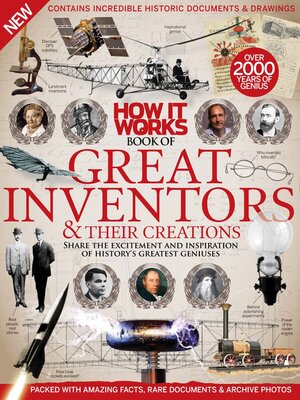How It Works Book of Great Inventors & Their Creations
magazine ∣ How It Works Book of Great Inventors & Their Creations 3rd Edition · How It Works Book of Great Inventors & Their Creations

Sign up to save your library
With an OverDrive account, you can save your favorite libraries for at-a-glance information about availability. Find out more about OverDrive accounts.
Find this title in Libby, the library reading app by OverDrive.



Search for a digital library with this title
Title found at these libraries:
| Library Name | Distance |
|---|---|
| Loading... |
Please type the description of the issue
GREAT INVENTORS & THEIR CREATIONS
10 INVENTIONS THAT CHANGED THE WORLD
Printing Press (1450) • The printing press revolutionised the accessibility and proliferation of knowledge
Telescope (1609) • The most important tool in astronomy, it has broadened humanity’s knowledge of the universe
Steam Engine (1712) • Allowing for items to be manufactured on a large scale, the steam engine opened up incredible possibilities
Plastic (1856) • From celluloid and Bakelite to nylon and PVC, plastics have many uses
Telephone (1876) • The invention that changed communication forever
Airplane (1903) • How the Wright brothers designed and flew the first heavier-than-air vehicle
Television (1926) • From humble origins to the most popular entertainment appliance on Earth, the television has connected societies and disseminated information
Touch screens (1965) • Altering how we interact with the world, they allow direct control of information appliances
GPS (1973) • Without it, we’d be lost
The Internet and WWW (1960s & 1989) • How global communication became simple, easy and instantaneous
Archimedes (c.287 BCE–c.212 BCE)
Block and tackle
al-Jazarī (1136–1206)
The influence of islamic scholars
Johannes Gutenberg (c.1400–3 February 1468)
Rotary printing press
Leonardo da Vinci (15 April 1452–2 May 1519)
Leonardo’s military inventions
Hans Lipperhey (1570 – September 1619)
Galileo Galilei (1564–1642)
Cornelius Drebbel (1572–October 1633)
The development of thermometers
Benjamin Franklin (17 January 1706–17 April 1790)
Researches in electricity
James Watt (19 January 1736–25 August 1819)
The lunar society
Nicéphore Niépce (7 March 1765–5 July 1833)
Louis Daguerre (1787–1851)
Richard Trevithick (13 April 1771–22 April 1833)
The rainhill trials
Michael Faraday (22 September 1791–25 August 1867)
James Clerk Maxwell (1831–1879)
Charles Babbage (26 December 1791–18 October 1871)
Analytical engine
Joseph Lister (5 April 1827–10 February 1912)
Ignaz Semmelweis (1818-1865)
Alfred Nobel (21 October 1833–10 December 1896)
The big idea
Karl Benz (25 November 1844–4 April 1929)
Henry Ford (1863–1947)
Thomas Edison (11 February 1847–18 October 1931)
The phonograph
Alexander Graham Bell (3 March 1847–2 August 1922)
Elisha Gray (1831-1901)
George Eastman (12 July 1854–14 March 1932)
The Brownie
Nikola Tesla (10 July 1856–7 January 1943)
War of currents
Auguste and Louis Lumière (19 October 1862–10 April 1954 and 5 October 1864–6 June 1948)
Pioneers of motion pictures
Wilbur and Orville Wright (16 April 1867–30 May 1912 & 19 August 1871–30 January 1948)
Otto Lilienthal (1848-1896)
Guglielmo Marconi (25 April 1874–20 July 1937)
Lee De Forest (1873–1961)
Carl Bosch (27 August 1874–26 April 1940)
Fertilizers
Vladimir Zworykin (30 July 1889–29 July 1982)
Television pioneers
Juan de la Cierva (21 September 1895–9 December 1935)
Helicopters
Wernher von Braun (23 March 1912–16 June 1977)
Early spaceflight pioneers
Alan Turing (23 June 1912–7 June 1954)
The central processing unit
Gertrude Elion (23 January 1918–21 February 1999)
Transplant surgery
Tim Berners-Lee (born 8 June 1955)
Doug Engelbart (1925–2013)
CREDITS







